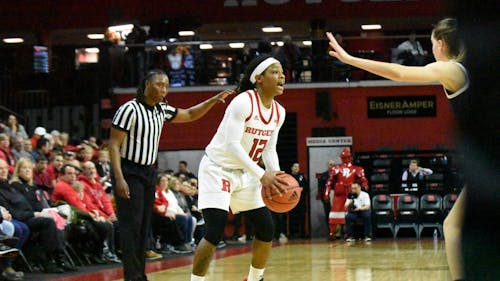Rutgers' Sanders shows development on court after missing 2018-19 season

Junior guard Arella Guirantes is leading the Rutgers women’s basketball team in points per game (PPG) and total blocks, while also averaging the second most rebounds per game (RPG) in the 22 contests she’s appeared in. In addition, Guirantes is averaging the most minutes per game on the team, playing 2.5 more than her teammate with the next-highest total.
She has been, with certainty, the most productive player on the Scarlet Knights’ (17-6, 7-5) roster this year.
While many of her teammates have not been able to put up the same kind of numbers this season or lead the team in various categories like Guirantes has, there have been a few that have showed their worth in a less-noticeable fashion.
Graduate student guard Khadaizha Sanders is one of those players.
Coming into this year after sitting out the 2018-19 season due to injury, Sanders has been able to replicate and even improve upon many of her statistics from previous years. Categories such as PPG, assists per game, RPG and shooting marks from both the field and beyond the arc are all areas that Sanders is sporting career bests in. She is also posting the second-best steal and turnover numbers of her career.
Although this can be considered unprecedented in comparison to her previous years with Rutgers, Sanders seemed to have had her mind set on contributing in any way that she could for her team ever since she decided to come back for a fifth year.
“I want to produce anyway I can whether it’s scoring, assisting, rebounding, anything,” Sanders said before the school year began. “I’m willing to do whatever.”
Her ability to do so, combined with some of her teammates’ improved play this season (see Guirantes), can be looked at as some of the reasons as to why the Knights are improved in numbers this year.
Last season, Rutgers averaged 64.1 PPG, 13.4 assists per game and 35.7 RPG while shooting 42 percent from the field and 29 percent from three. This year, the Knights are tallying 67.7 PPG, 13.7 assists per game and 39.7 RPG while shooting 43 percent and 31 percent from the field and beyond the arc, respectively.
Though not eye-popping developments, Sanders’s ability to contribute with 10.4 PPG on 41 percent and 33 percent marks, while also chipping in with 4.3 assists per game and 3.4 RPG, is part of the explanation as to why Rutgers has been able to have any improvement at all in those areas.
She has also been a veteran presence for a team that entered this season with a relatively young bench, as it is comprised of two true freshman, one redshirt freshman, three sophomores and one graduate student.
As head coach C. Vivian Stringer has attempted to find playing time for the group of players without sacrificing its development, Sanders has often filled in, averaging the second-most minutes per game of her career as a result. Currently participating in 33.7 minutes per contest, the only other time she averaged more was in the 2016-17 season, when she tallied 33.9 per game for the Knights.
Though Sanders’ growth has not been the end-all, be-all cure for Rutgers, as the team currently holds a 2-4 record in its past six games, her progress on the court has nevertheless improved the Knights’ overall statistics.
Rutgers still has six regular season games remaining, and with her team in need of a late-season surge to even be considered to be in the NCAA Tournament, Sanders has the chance to use her play on the court as an opportunity to lead a Knights team that couldn’t seem to be in more need of it at this point in the season.



